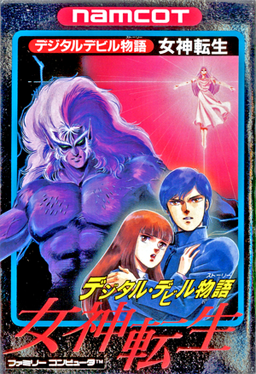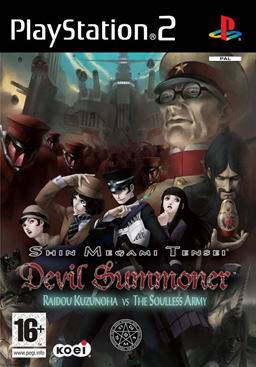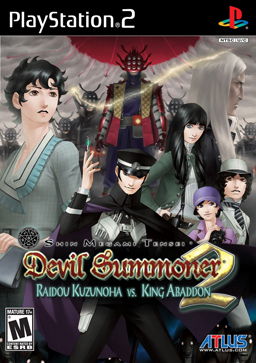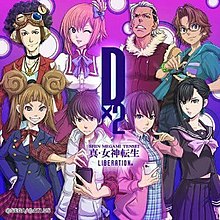
Atlus Co., Ltd. is a Japanese video game developer, publisher, arcade manufacturer and distribution company based in Tokyo. A subsidiary of Sega, the company is known for video game series such as Megami Tensei, Persona, Etrian Odyssey, and Trauma Center, as well as Print Club (Purikura) arcade machines. Its corporate mascot is Jack Frost, a snowman-like character from their Shin Megami Tensei series. Outside of video games, the company is known for their Purikura arcade machines, which are selfie photo sticker booths popular in East Asia.
Megami Tensei, marketed internationally as Shin Megami Tensei, is a Japanese media franchise created by Aya Nishitani, Kouji "Cozy" Okada, Ginichiro Suzuki, and Kazunari Suzuki. Primarily developed and published by Atlus, and currently owned by Atlus, the franchise consists of multiple subseries and covers multiple role-playing genres including tactical role-playing, action role-playing, and massively multiplayer online role-playing. The first two titles in the series were published by Namco, but have been almost always published by Atlus in Japan and North America since the release of Shin Megami Tensei. For Europe, Atlus publishes the games through third-party companies.

Shin Megami Tensei is a role-playing video game developed and published by Atlus for the Super Famicom. Originally released in 1992 in Japan, it has been ported to multiple systems and eventually released in the West for iOS in 2014. It was released on the Virtual Console service in Japan on Wii in 2007 and on Wii U in 2013, as well as Nintendo Switch Online in 2020. It is the third game in the Megami Tensei series and the first in the central Shin Megami Tensei series. The gameplay uses first-person navigation of dungeons and turn-based battles against demons. The player can recruit demons as allies by talking to them rather than fighting them, and two to three demons can be fused to create new demons.

Digital Devil Story: Megami Tensei refers to two distinct role-playing video games based on a trilogy of science fantasy novels by Japanese author Aya Nishitani. One version was developed by Atlus and published by Namco in 1987 for the Famicom—Atlus would go on to create further games in the Megami Tensei franchise. A separate version for personal computers was developed and published by Telenet Japan with assistance from Atlus during the same year.

Shin Megami Tensei III: Nocturne is a role-playing video game developed by Atlus for the PlayStation 2. It was published by Atlus in Japan and North America, and by Ghostlight in Europe. It is the third numbered entry in the Shin Megami Tensei series, the central series in the Megami Tensei franchise. Multiple versions of the game have been published: the original version was published in Japan by Atlus in 2003, while a director's cut was released in 2004 in Japan. The director's cut was localized and released in North America in 2004 as Shin Megami Tensei: Nocturne and in PAL regions in 2005 as Shin Megami Tensei: Lucifer's Call. A high-definition remaster was released for the Nintendo Switch and PlayStation 4 in Japan in 2020, and was internationally released in 2021 on those consoles and Windows.

Shin Megami Tensei: Digital Devil Saga is a duology of role-playing video games developed by Atlus for the PlayStation 2. They are a spin-off of the Megami Tensei series. The first Digital Devil Saga was released in Japan in 2004, North America in 2005, and Europe in 2006. Its direct sequel, Shin Megami Tensei: Digital Devil Saga 2, released in 2005 in Japan and North America, and 2007 in Europe and Australasia. The games were published in Europe and Australasia by Ghostlight and in other regions by Atlus and its North American subsidiary Atlus USA.

Shin Megami Tensei If..., stylized as Shin Megami Tensei if…, is a role-playing video game developed and published by Atlus in 1994 for the Super Famicom. It is a spin-off from the Shin Megami Tensei series, itself part of the larger Megami Tensei franchise. Since release, it has been ported to mobile devices, PlayStation and Microsoft Windows; it had also been re-released on the Virtual Console in Japan on Wii in 2011 and Wii U in 2013, as well as Nintendo Switch Online in 2021. The story follows a student of Karukozaka High School after their school is sucked into the realm of demons by a vengeful student's demon summoning spell going wrong.

Devil Summoner: Soul Hackers is a 1997 role-playing video game developed by Atlus. The game is the second installment in the Devil Summoner series, itself a part of the larger Megami Tensei franchise. Originally published by Atlus for the Sega Saturn, it was later ported to the PlayStation in 1999 and Nintendo 3DS in 2012.

Devil Summoner: Raidou Kuzunoha vs. the Soulless Army is an action role-playing game developed by Atlus for the PlayStation 2. The game is the third in the Devil Summoner series, which is a part of the larger Megami Tensei franchise. It was published by Atlus in Japan and North America in 2006, and in Europe the following year.

Shin Megami Tensei: Devil Summoner is a role-playing video game developed and published by Atlus. Forming part of the Megami Tensei franchise, it is the first title in the Devil Summoner series. It was first released for the Sega Saturn in December 1995, and received a port to the PlayStation Portable in December 2005. Despite reports of it being planned for localization, neither version has been released outside Japan.

Megami Tensei Gaiden: Last Bible is a role-playing video game series developed by Multimedia Intelligence Transfer, Sega, and Menue, and published by Atlus and Sega for multiple platforms. The first game of the series, Revelations: The Demon Slayer, was released in 1992; this is the only title in the series to have been released in English. After The Demon Slayer, two sequels and five spin-off titles have been released. In the main series titles, players explore the game world and fight monsters in menu-based battles; players can also attempt to recruit monsters to their party, and can fuse two allied monsters into a single new one to try to get stronger monsters. The spin-off title Another Bible is a turn-based strategy game, while Last Bible Special is a role-playing game controlled from a first-person perspective.

Shin Megami Tensei: Devil Children, also known as DemiKids, is a series of role-playing video games primarily developed by Multimedia Intelligence Transfer and published by Atlus. It is a spin-off from Atlus' Megami Tensei franchise, and began in 2000 with the Game Boy Color games Black Book and Red Book. Five more role-playing games and three games in other genres were released until 2004, followed by no new releases until the 2011 social game Shin Megami Tensei: Devil Children. In addition to the games, the series has been adapted into manga, anime, and a trading card game, and two soundtrack albums have been released by First Smile Entertainment.

Shin Megami Tensei: Imagine, formerly known as Megami Tensei Online: Imagine, was a massively multiplayer online role-playing game (MMORPG) for Windows. It is part of the Megami Tensei series, and was developed by CAVE and later on GungHo Online Entertainment under license from the series creator Atlus. Originally released in Japan in 2007, it was later released in North America in 2008, then in Europe in 2009. Imagine is set between Shin Megami Tensei and its sequel, in the aftermath of a war which devastated humanity and prompted the arrival of hostile demons split into two opposing factions: Law and Chaos. The player character, a Demon Buster, is tasked with interacting with and fighting the demons that infest post-apocalyptic Tokyo. The gameplay uses real-time combat in open environments similar to other MMORPGs, while carrying over the Megami Tensei series' recurring demon recruitment and fusion mechanics.

Devil Summoner 2: Raidou Kuzunoha vs. King Abaddon is an action role-playing game developed and published by Atlus for the PlayStation 2. The game is the fourth in the Devil Summoner series, which is a part of the larger Megami Tensei franchise, and serves as the direct sequel to Devil Summoner: Raidou Kuzunoha vs. the Soulless Army. It was released in Japan in October 2008, and in North America in May 2009.

Devil Summoner, initially marketed as Shin Megami Tensei: Devil Summoner, is a video game franchise developed and primarily published by Atlus. Focused on a series of role-playing video games, Devil Summoner is a spin-off from Atlus' Megami Tensei franchise. The first entry in the series, Shin Megami Tensei: Devil Summoner, was released in 1995 for the Sega Saturn. The series has seen several more games since, with the most recent main entry being Soul Hackers 2 released in 2022.

Shin Megami Tensei: Devil Survivor is a tactical role-playing video game in the Megami Tensei series developed by Atlus for the Nintendo DS. It was released in Japan on January 15, 2009, and in North America on June 23, 2009. An enhanced port for the Nintendo 3DS, Shin Megami Tensei: Devil Survivor Overclocked, was also developed by Atlus and released in 2011 for Japan and North America while in 2013 for Europe.

Shin Megami Tensei: Strange Journey is a role-playing video game developed by Atlus and Lancarse for the Nintendo DS. The game is the sixth entry in the Shin Megami Tensei series, which forms the core of the Megami Tensei franchise. It was released in Japan in 2009, and in North America in 2010. An enhanced port for the Nintendo 3DS, Shin Megami Tensei: Strange Journey Redux, was released in Japan in 2017, and was released internationally in 2018 by Atlus in North America and Deep Silver in Europe.

Shin Megami Tensei IV is a role-playing video game developed and published by Atlus for the Nintendo 3DS. It is part of the Shin Megami Tensei series, the central series of the Megami Tensei franchise, though no direct story connection exists to previous entries. It was released in May and July 2013 for Japan and North America respectively. It was released digitally in PAL territories on October 2014. The gameplay is reminiscent of previous Shin Megami Tensei games, carrying over the turn-based Press Turn battle system, where players and enemies fight and exploit weaknesses, allowing either side to gain additional turns or lose them.
Atlus West, formerly known as Atlus U.S.A., Inc., is the North American publishing branch of Japanese video game company Atlus, primarily known for localizing games for both them and other third-party developers. Its first original role-playing game was Revelations: Persona on the PlayStation, described by staff as an attempt to break into the Western role-playing game market and establish the company's Megami Tensei franchise through its Persona sub-series.

Shin Megami Tensei V is a 2021 role-playing video game developed and published by Atlus for the Nintendo Switch. It is part of the Shin Megami Tensei series, the central series of the larger Megami Tensei franchise. Produced by Shin Megami Tensei IV director Kazuyuki Yamai, it was designed as a hybrid between Shin Megami Tensei III: Nocturne and Shin Megami Tensei IV, featuring returning gameplay mechanics such as raising and fusing demons.

















